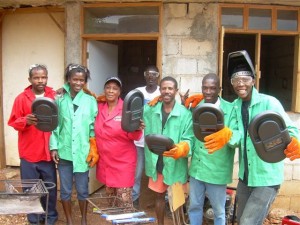ILMO Branch Director Teaches Welding in Haiti
Returned from teaching trip four days before earthquake.
 To say that Gailyn "Gay" Cornell can take control a room would be an understatement. She’s a firecracker, a pioneer in the welding field for women and all welding trainers, and she didn’t get that reputation by being satisfied with just a roomful of attention – she wants to speak to the world.
To say that Gailyn "Gay" Cornell can take control a room would be an understatement. She’s a firecracker, a pioneer in the welding field for women and all welding trainers, and she didn’t get that reputation by being satisfied with just a roomful of attention – she wants to speak to the world.
Gay is the Branch Services Director at ILMO Products Company, an industrial, medical and specialty gases distributor in Illinois and Missouri, with roots in supplying gases, equipment, and supplies to the welding industry.
She got her start with Lincoln Electric in the 1970’s in their welding program and has been a highly-involved advocate for the trade, and the American Welding Society, ever since.
In late 2009, Gay’s niece was sharing her plans to take part in her second medical mission trip to a remote mountainous area of Haiti – Calebasse – where the year before she saw first-hand the vibrant energy and desperate need of the people there. Her niece identified the potential for a drastic lifestyle improvement for the community if they could only manage their own metal work repairs, and Gay instantly joined the trip to teach them how to weld.
Gay’s trip to Haiti, flying out New Year’s Day, 2010, brought them back on Sunday, January 8, just four days before the country was rocked with a devastating earthquake. The following is an interview with Gay in the first week of February, 2010.
Before you left, what did you do to prepare for? What did you have to acquire and pack? Did you have someone to talk to who had experience welding in Haiti or know what your teaching conditions would be like?
"I knew that electricity was limited and I would have to work off a generator. Lincoln Electric’s retail division, WCTA, donated an inverter welder (a 30 lb stick welder that operates on 115v) and ILMO Products Company donated the remainder of the supplies, such as electrode and safety supplies. I knew very little about the conditions other than the people were really excited to learn and I would have to work through an interpreter. I was confident that I could deal with any situation once I got there, though with Creole as the common language, I knew my limited high school French would not be sufficient.
"We had to carry everything with us so getting the welding equipment, supplies, and steel through airport security at 6:00 AM was a difficult experience. But after learning our purpose, they were good-natured and teased us as they went through the extra work of unpacking and packing our “stuffed to the limit” suitcases.
Once you were there and ready to teach, what were your conditions? Were there any scary realities that you were exposed to while teaching on that first day?
"The first day was chaotic. We rushed to unpack supplies so they could be hauled to the church, which is where the welding classes and medical clinic were based. I’d never used this particular welder, and we needed gas for the generator, and the students were already gathered around. There were no welding tables so a rock ledge became our classroom. Once we started, we quickly realized that welding terms are not commonly translated words, and this added time. When the generator finally ran out of gas and we packed up for the night, it occurred to me for the first time, that perhaps I’d over-estimated my abilities."
Describe your students, your projects, and the learning atmosphere while they were discovering how to weld.
"The students were so enthusiastic and the look of excitement when they mastered their first weld was unforgettable and incredibly rewarding! Our first project arrived on the second day. It was a bed with almost every existing weld broken. Then more beds, grills (the primary form of cooking), chairs and other items began to roll in. The students took so much pride in being recognized as welding students that, even when we were not in class, they kept their welding jackets and gloves on until it was time to pack everything up at the end of each day.
Could you share a welding project or story about a student that touched you?
"My hope was to find one or two students that would master the art well enough to do repairs and share the skill with others after I was gone. Lelly was my star student and a natural teacher. By the end of the second day, he was leading the group and my confidence in the success of the program returned. By the third day, I was little more than an observer, there only to answer questions when they arose and offer a little guidance. By the last day, the students worked successfully on projects as a group and I knew we had accomplished even more than I hoped for."
Did you get a feel of how this new skill would impact or improve these individuals’ lives?
"All of the equipment and supplies were left behind as the property of the church, with Lelly as the coordinator and instructor. All involved were thrilled that the next welding clinic was scheduled for the following Saturday, and we knew this skill would change so many things for them. Each bed that was repaired meant that someone didn’t have to sleep on the floor that night. Each grill that was repaired meant that someone could cook dinner. The church was planning to do local repairs for nominal fees to help defray the cost of gas for the generator, so big plans for ongoing improvements were in place."
What did you identify as “next steps” to help these students change their lives with their new welding skills?
"There was a community meeting after church. I was surprised at the amount of questions directed at the welding training. There is a strong desire for a trade school to develop professional skills and employment opportunities. It was sad to leave but I was also gratified with the success of the project. The bond that developed in just a week caught me off guard. What they wanted to know is if I would come back and when. We promised to keep in touch until I returned."
Then, just 4 days after your return, Haiti suffered a catastrophic earthquake devastating millions of its citizens. What happened to your friends and contacts? How did you communicate with them? What is their reality now?
"Half of the town is gone. Communication is limited to a few phone calls and emails. Some of our friends have been killed and many others injured, but we still don’t know the full impact. Food is scarce and despite our attempts so far, getting money and supplies to the remote areas continues to be difficult."
Considering how heavily this disaster has been weighing on you and forcing you to recall the importance of teaching them to weld only days ago, what’s next for you, for welding, in Haiti?
"I left Haiti with plans to continue welding classes and bringing more equipment as we raised funds for a technical school. Now the focus has moved to the immediate need of rebuilding. Our group is researching construction improvements and the possibility of using shipping containers as housing and shelter. Ideally, we will be able to partner with a charitable organization to make arrangements to leave shipping containers in Haiti after the supplies are delivered."
In one or two simple steps, what can others in the welding industry do to help you carry out your plans for continuing welding training in Haiti?
"I can be reached through gcornell@ilmoproducts.com or 217-242-0012. We need equipment donations, smaller generator welders, diesel if possible, oxy fuel cutting equipment, and related supplies for immediate use. Monetary donations can be made to www.Hearts4Haiti.org. At this time, all money donated will go directly to Calebasse for food and clothing and a separate 'Rebuild Calebasse' project and funding are in progress."
ILMO Products Company is extending their initial commitment of supplies and support to the “Welding in Haiti” project through Ms. Cornell, and encourages others to get involved.
ILMO Products Company, headquartered in Jacksonville, IL, is a family-owned distributor of industrial, specialty, and medical gases in bulk, micro-bulk, and cylinder solutions, as well as welding and safety equipment, industrial supplies and accessories, and welder repair services. ILMO was founded in 1913 and operates nine branches throughout Illinois and Missouri, including St. Louis, ILMO Specialty Gases’ ISO/IEC17025:2005
Accredited Gas Laboratory serves customers across the U.S., Canada, and South America, and proudly supplies Purity Plus gases. For more information about ILMO, visit www.ilmoproducts.com.
















